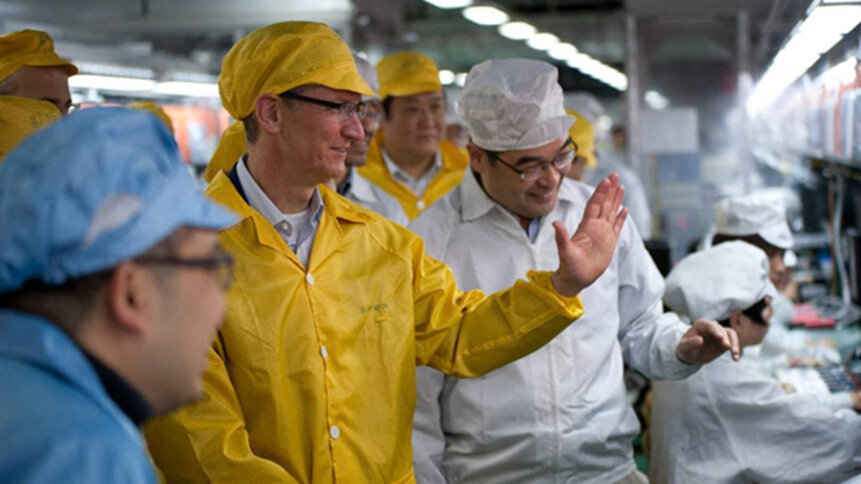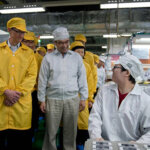What’s next for Foxconn and Apple after iPhone City clashes?

In Zhengzhou, China, there is a state-of-the-art facility that was built several years ago to serve a single global exporter: Apple, now the world’s most valuable company and one of China’s largest retailers. The sprawling manufacturing complex, run by Apple’s manufacturing partner Foxconn, is known by many as iPhone City. As of early this week, a large part of the 200,000-person workforce had already spent weeks living in forced isolation in trash-filled dormitories.
Since October in fact, those employees have been subsisting on meager rations because management wanted to keep churning out iPhones while containing a Covid-19 outbreak and enduring a very strict Covid Zero policy. On normal days, Foxconn’s mega-factory can produce 500,000 iPhones a day — but that has not been the case recently, especially after Apple launched its latest line up of iPhones in September.
Why is China so important for Apple?
No American company makes as much money in China as Apple. While few make that much money at all, Apple raked in US$68.4 billion of revenues in Greater China during the 2021 financial year, mostly from selling iPhones. The tech giant even became China’s top OEM the same year, capturing 23% market share, its highest ever. Few countries have had as much power as China to shape Apple’s fortunes.
But in China, Apple is not strong alone. Its meteoric rise has a lot to do with its partnership with the world’s biggest contract assembler of smartphones and other electronics — Foxconn, a Taiwanese giant formerly known as Hon Hai Precision Industry. Foxconn is not just Apple’s subcontractor, its fortunes remain very much entwined with the American company’s.
What has been going on at iPhone City?
The tensions that have been brewing since October has led up to this Wednesday, where hundreds of Foxconn factory workers, angry to learn they might not get the wages they’d been promised unless they kept at their jobs throughout the Spring Festival and into mid-March, ignited a riot, setting off a physical confrontation with police.
“The violence that peaked on November 23rd showed how inadequate that effort has been, while also exposing the increasing futility of China’s Covid strategy. Throughout the pandemic, the Chinese Communist Party has shown a willingness to go to extremes in its efforts to combat Covid. It pushed companies such as Foxconn Technology Group and Tesla Inc. to cut off their facilities from the outside world, then continue operating them as ‘closed-loop systems’,” a report by Bloomberg noted.
For context, Taiwan’s Foxconn, Apple’s main manufacturing partner, operates iPhone City independently. It has acknowledged that it has made mistakes in managing the employees there, while blaming local officials for unpredictable policies that made meal delivery and maintenance almost impossible, Bloomberg said, quoting a person familiar with the company.
The production of iPhones has also continued to drop since October thanks to “a significantly reduced capacity,” Apple said. The company added that its production woes would mean that customers would face longer wait times between the purchase and delivery of its high-end iPhone 14 Pro and 14 Pro Max. Although Apple has repeatedly said that Covid-19 constraints have caused billions of dollars worth of supply issues throughout the pandemic, it has never issued such a warning outside of earnings calls since February 2020.
The shutdown of the factory in Zhengzhou is actually the second to affect Apple this year. It lost about US$4 billion in sales of iPads and Macs over the spring and summer, according to estimates, after factories outside of Shanghai were closed to limit the spread of Covid-19. So one can only imagine the cost for Apple of everything going on in its single largest plant for its iPhone — after all, it is a factory that accounts for more than half of the phone’s annual sales.
Zero-Covid policy hurting manufacturing
The truth is, as long as China doesn’t relent from its zero-Covid policy, it’s going to have a big impact on Foxconn and Apple because these premium phones were the last area of the smartphone market that have been in demand. As of now, people have had enough of China’s zero-Covid policy — and that is why protests have been breaking out in Zhengzhou. The ruling Communist Party is actually facing rising frustration about repetitive, if not extended restrictions in areas across China.
In fact, when Foxconn locked down its Zhengzhou plant, some factory workers even went to the extreme of fleeing the facility and began walking toward their homes across the countryside. Images and videos of them leaving spread across social media. But Foxconn can’t afford to lose employees, so the company responded by offering workers an extra US$14 a day to continue working. It later increased those payments to US$55 a day.
By early this month, Foxconn’s offer had risen to 10,000 yuan (US$1,400) for newly hired employees who wanted to quit and return home, the finance news outlet Cailianshe reported, citing unidentified recruiting agents. But many stayed — until this week, at least. On Wednesday, workers were heard in a video saying that Foxconn had failed to honor its promise of an attractive bonus and pay package after they arrived to work at the plant.
Bloomberg, quoting Natixis’ chief Asia Pacific economist Alicia Garcia Herrero said that while Foxconn’s troubles have drawn the most attention because of the company’s prominence and size, its struggles also suggest that others may be having even more trouble operating within the parameters of China’s policies. “You see cases like Foxconn, and every company is now asking themselves, ‘Will that happen to me?’”
“Any company that depends on manufacturing has to consider alternatives. It will be costly, but it will be less costly than only relying on China and then China doesn’t open up.” Herrero even suggested that China’s economy could still take a year to 18 months to open up, and that could spell doom for both Apple and Foxconn. The upside is that Apple, under the helm of Tim Cook, has been developing alternatives in its supply chains.
Assembly partners such as Foxconn are now making more iPhone 14 models in India than any previous generation, and are beginning to use the country as an export base. The same Taiwanese giant is also expanding in Vietnam and Thailand, to further support Apple.









